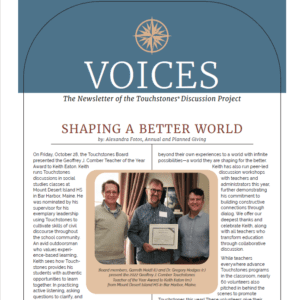By Abraham Zhao
Has everyone started using “Zoom”, “Google Meet,” or “Microsoft Teams” in their daily vocabulary yet? Zoom became a part of my daily vernacular when I ran two Touchstones Discussion Programs for middle schoolers this summer. During those sessions, I spent every weekday excitedly logging into Zoom meetings with groups of 5th-8th graders from around the country. In my first program, I used lessons from the Touchstones Math and Science volume: Where’d They Get that Idea? For the second program, I switched to Touchstones Volume B, to build on and broaden our initial examinations. Our journey took us from wondering how our perception of the world affects our scientific methods to asking if speeches can be as true as mathematical equations. And we talked about how life in isolation changes people. Importantly, the group learned to be open and honest about their own attitudes in the discussions. It was incredible to see students make real efforts to listen to one another and change their own behavior to benefit their peers.
Running two different summer programs showed me firsthand how much work it takes to run an effective Touchstones group. Readers may already know how our phenomenal facilitators make running a good discussion look as easy as breathing. But in facilitating these groups myself, I gained a newfound level of respect for these incredible individuals. Intimate and thorough lesson planning is critical for new Touchstones teachers. So are the social skills required to navigate human dynamics. One must be prepared for the frustrations that arise during hectic debates. And patience and self-restraint are key, so students arrive at their own conclusions. Throughout the programs, I was deeply impacted by my experience with the Teacher’s Guides and their role in my own development. Every minute I spent reading the thoughtfully crafted lesson plans was immeasurably helpful. Questions suggested in the lessons genuinely interested students. Even in these shortened programs, I could see the positive change for which Touchstones is so well known.
My students had a great experience with the program, too. In the post-program survey, one wrote, “This was an experience that helped me grow in terms of how I think and how I work together with other people in a group.” A participant from Maryland’s Prince George’s County said, “We often take a person or textbook’s point of view and never explore the why. After completing this program, I started to ask more questions to gain a better understanding.” Even our younger participants found their voices in the program—something that doesn’t always happen in groups with multiple grade levels. One of those students shared, “Touchstones is a great way to learn how to listen to and hear other people. It has helped me feel more comfortable speaking up in public.”
The Touchstones 2020 Summer Programs were a great way to test our school programs in digital classrooms. We saw opportunities to adapt our materials for greater inclusivity. And we were able to see what teachers need to anticipate as they provide their own students with opportunities for active learning. This project gave us an architecture for future online programs—ones where students maintain a collaborative spirit while powering through what’s surely to be a crazy year. I look forward to all the ways that Touchstones and other educational program entrepreneurs will produce dynamic, resilient learning models in the face of this crisis.



 Join the
Join the